For the 2025 school year, there are 3 public schools serving 531 students in Kaleva Norman Dickson School District. This district's average testing ranking is 4/10, which is in the bottom 50% of public schools in Michigan.
Public Schools in Kaleva Norman Dickson School District have an average math proficiency score of 23% (versus the Michigan public school average of 34%), and reading proficiency score of 34% (versus the 46% statewide average).
Minority enrollment is 13% of the student body (majority American Indian and Hispanic), which is less than the Michigan public school average of 37% (majority Black).
Overview
This School District
This State (MI)
# Schools
3 Schools
3,509 Schools
# Students
531 Students
1,376,331 Students
# Teachers
30 Teachers
82,379 Teachers
Student : Teacher Ratio
18:1
18:1
District Rank
Kaleva Norman Dickson School District, which is ranked within the bottom 50% of all 851 school districts in Michigan (based off of combined math and reading proficiency testing data) for the 2021-2022 school year.
The school district's graduation rate of 70-79% has stayed relatively flat over five school years.
Overall District Rank
#574 out of 866 school districts
(Bottom 50%)
(Bottom 50%)
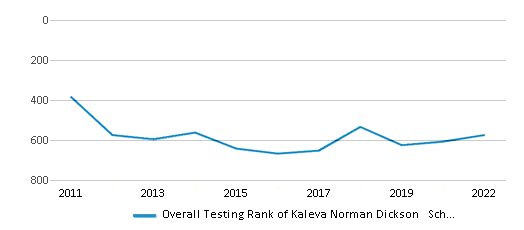
Math Test Scores (% Proficient)
22%
34%
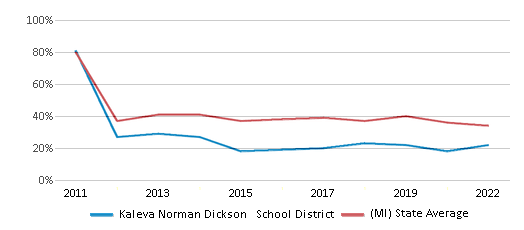
Reading/Language Arts Test Scores (% Proficient)
34%
45%
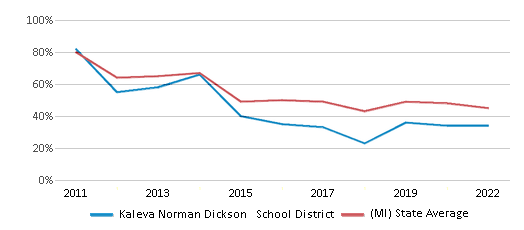
Science Test Scores (% Proficient)
35-39%
38%
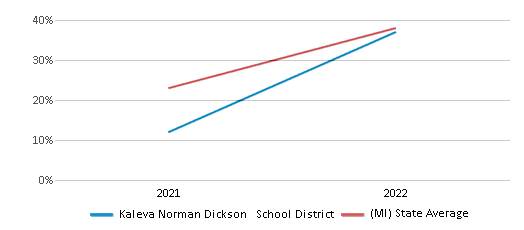
Graduation Rate
70-79%
81%
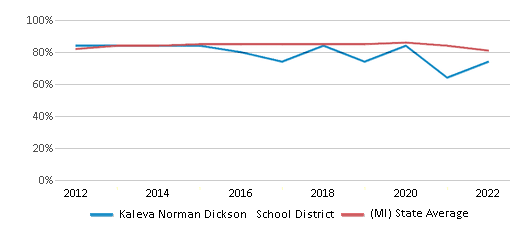
Students by Ethnicity:
Diversity Score
0.24
0.56
# American Indian Students
26 Students
8,574 Students
% American Indian Students
5%
1%
# Asian Students
4 Students
50,770 Students
% Asian Students
1%
4%
# Hispanic Students
20 Students
125,678 Students
% Hispanic Students
4%
9%
# Black Students
12 Students
244,434 Students
% Black Students
2%
18%
# White Students
461 Students
871,645 Students
% White Students
87%
63%
# Hawaiian Students
n/a
1,208 Students
% Hawaiian Students
n/a
n/a
# Two or more races Students
8 Students
73,219 Students
% of Two or more races Students
1%
5%
Students by Grade:
# Students in PK Grade:
-
-
# Students in K Grade:
45
110,461
# Students in 1st Grade:
40
100,790
# Students in 2nd Grade:
35
102,777
# Students in 3rd Grade:
31
100,401
# Students in 4th Grade:
40
101,847
# Students in 5th Grade:
45
101,136
# Students in 6th Grade:
45
102,120
# Students in 7th Grade:
40
103,285
# Students in 8th Grade:
41
102,692
# Students in 9th Grade:
36
114,669
# Students in 10th Grade:
51
112,993
# Students in 11th Grade:
37
109,871
# Students in 12th Grade:
45
109,317
# Ungraded Students:
-
3,972
District Revenue and Spending
The revenue/student of $14,934 in this school district is less than the state median of $18,510. The school district revenue/student has stayed relatively flat over four school years.
The school district's spending/student of $14,320 is less than the state median of $17,693. The school district spending/student has stayed relatively flat over four school years.
Total Revenue
$8 MM
$25,476 MM
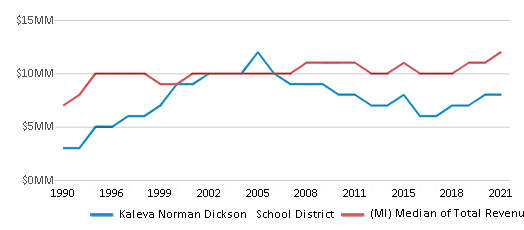
Spending
$8 MM
$24,351 MM
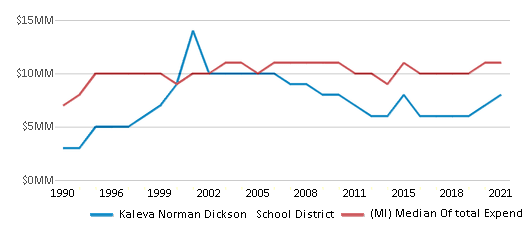
Revenue / Student
$14,934
$18,510
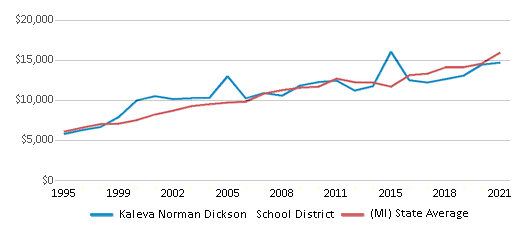
Spending / Student
$14,320
$17,693
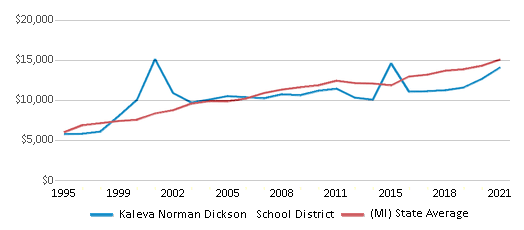
Best Kaleva Norman Dickson School District Public Schools (2025)
School
(Math and Reading Proficiency)
(Math and Reading Proficiency)
Location
Grades
Students
Rank: #11.
Brethren Middle School
(Math: 30-34% | Reading: 50-54%)
Rank:
Rank:
6/
Top 50%10
4400 N High Bridge Rd
Brethren, MI 49619
(231) 477-5353
Brethren, MI 49619
(231) 477-5353
Grades: 7-8
| 81 students
Rank: #22.
Brethren High School
(Math: 20-29% | Reading: 40-49%)
Rank:
Rank:
5/
Bottom 50%10
4400 N High Bridge Rd
Brethren, MI 49619
(231) 477-5353
Brethren, MI 49619
(231) 477-5353
Grades: 9-12
| 169 students
Rank: #33.
Knd Elementary School
Magnet School
(Math: 15-19% | Reading: 20-24%)
Rank:
Rank:
2/
Bottom 50%10
4400 Highbridge Rd
Brethren, MI 49619
(231) 477-5353
Brethren, MI 49619
(231) 477-5353
Grades: K-6
| 281 students
Frequently Asked Questions
How many schools belong to Kaleva Norman Dickson School District?
Kaleva Norman Dickson School District manages 3 public schools serving 531 students.
What is the rank of Kaleva Norman Dickson School District?
Kaleva Norman Dickson School District is ranked #568 out of 851 school districts in Michigan (bottom 50%) based off of combined math and reading proficiency testing data for the 2021-2022 school year.
What is the racial composition of students in Kaleva Norman Dickson School District?
87% of Kaleva Norman Dickson School District students are White, 5% of students are American Indian, 4% of students are Hispanic, 2% of students are Black, 1% of students are Asian, and 1% of students are Two or more races.
What is the student/teacher ratio of Kaleva Norman Dickson School District?
Kaleva Norman Dickson School District has a student/teacher ratio of 18:1, which is higher than the Michigan state average of 17:1.
What is Kaleva Norman Dickson School District's spending/student ratio?
The school district's spending/student of $14,320 is less than the state median of $17,693. The school district spending/student has stayed relatively flat over four school years.
Recent Articles

Year-Round Or Traditional Schedule?
Which is more appropriate for your child? A year-round attendance schedule or traditional schedule? We look at the pros and cons.

Why You Should Encourage Your Child to Join a Sports Team
Participating in team sports has a great many benefits for children, there is no doubt. In this article you will learn what those benefits are.

White Students are Now the Minority in U.S. Public Schools
Increasing birth rates among immigrant families from Asia and Central and South America, combined with lower birth rates among white families, means that for the first time in history, public school students in the United States are majority-minority. This shift in demographics poses difficulties for schools as they work to accommodate children of varying language abilities and socio-economic backgrounds.





